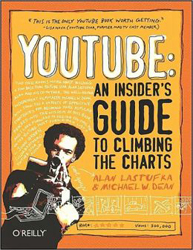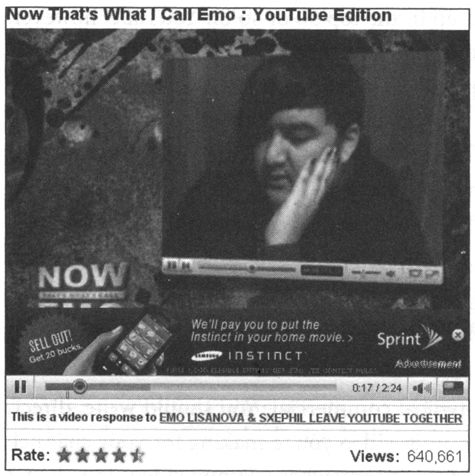YouTube: An Insider’s Guide

Mastering the new medium
By internet years, this is an ancient book (2008); Still, it’s the best one I’ve found for exploiting the new medium of YouTube. The millennial generation are not reading books, or newspapers; they are not watching TV, either, and in fact they aren’t really watching many movies. None of these are their cultural center. As far as I can tell their entire discretionary time is spent watching YouTube clips. It’s the source of entertainment and instruction. If you want to reach the young, do it on YouTube.
How? Well this guide is trying to help. YouTube is the newest broadcast/publishing/social medium with new rules and new stars. It will eventually be as important as books and TV combined. What makes a good YouTube station, how do you gets visits, or sell ads? This book is only the first word on those challenges. Since YouTube now offers the option of selling paid subscriptions to niche channels — a development not covered in this book — this is sure to ignite even more newbies to move in. Start with this basic how-to. Let us know when a better handbook comes along.
07/11/14Excerpt
Sample excerpts:
Low numbers can be frustrating for new bloggers and video makers. It's difficult to invest hours into making a video, only to upload it and find a day later that only some 10 or 12 people have watched it. Trust me when I say this, though -- we have all been there. If your content is interesting or funny and your shot isn't completely out of focus, you will gain more views over time. Faking your views will get you called out very quickly, and the majority of YouTubers will lose all respect for you.
*
The majority of views on your videos will be lurkers. Lurkers are people without accounts who watch and then move on. Lurkers don't rate, don't comment, and definitely don't make videos of their own. Lurkers are good for views, but not much else. This is why the average video views to comments ratio on YouTube is about 5 percent. Meaning, if you have 100 views, you should probably have about 5 comments; 1,000 views, 50 comments; and so on.
You want users watching your videos. You want people who will get to know, and support, you. The more invested a user feels in your channel, meaning, the more time and energy they've put in to watching and commenting and interacting with you, the more likely they are to pass your link around. Your subscribers, the regular watchers, are the ones who will rate your video every time, even if you're trying a new style of editing or writing. Your subscribers are the ones who will drop you sweet little private messages when you've been gone for more than a few days to make sure you're okay. This is where the heart of YouTube is and where you find your sense of community.
*
Most users get turned down because they simply don't have enough views or subscribers to qualify for partnership. The good news is, users without enough views or subscribers can continue uploading and may apply again at a later date. In addition to this "popularity" qualification, users with a history of violating YouTube's terms of use will not be accepted as Partners. Such violations could include uploading content that you don't own, uploading obscene content, spamming or harassing other users, and attempting to "cheat the system" for more views or subscribers.
*
YouTube ads are all paid for on a per-impression basis. Ad rates seem to vary from campaign to campaign, because earnings per view vary each and every month. AdSense ads display next to videos uploaded by Partners. You'll need to keep your AdSense account in good standing to remain in the Partner Program. This means you should not try to fraud the system by auto refreshing your videos. You should also not click over and over on your own ads; this gives the impression to advertisers that your videos are more popular than they actually are and breaks the contract you sign with YouTube when you become a Partner. (Both YouTube and AdSense have really smart software to detect all fraud techniques, and you will get caught.)
*
First, people will unsubscribe if they feel they're being overtly "marketed to." YouTube is an alternative to TV. If you make your channel too much like TV, people will go look at another channel.
Second, you're not going to make tons of money, just some money, so you may as well still have fun doing it, rather than making video production an unpleasant day job. There's no point in working toward quitting your day job if you simply replace it with another job that doesn't make you happy (and doesn't offer health insurance!).
*

YouTube: An Insider's Guide to Climbing the Charts Alan Lastufka, Michael W. Dean 2008, 304 pages $20






